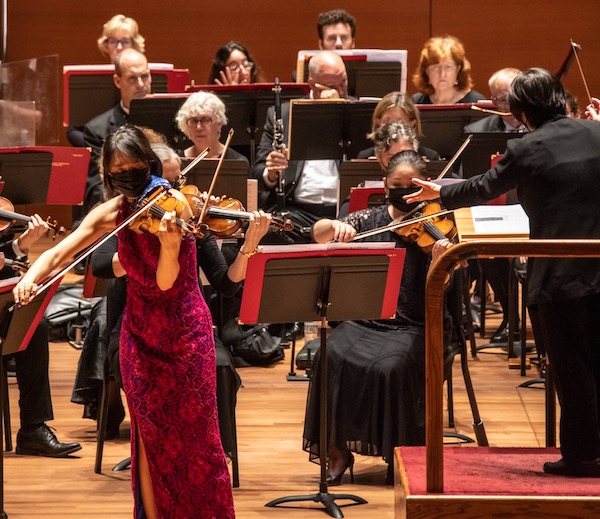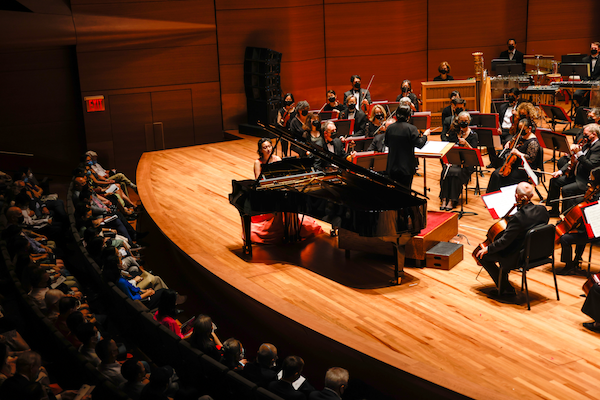East Meets West in New Jersey Symphony’s lyrical Chinese program

The New Jersey Symphony Orchestra crossed the Hudson River into Manhattan for a concert entitled “East/West: A Symphonic Celebration.”
The event was produced by China Arts and Entertainment Group Ltd. as part of its “Image China” cultural exchange initiative.
The highlights of this concert were the stellar performances by two rising stars, pianist Chelsea Guo and violinist Nancy Zhou, as well as the authenticity and sensitivity with which Xian Zhang, the NJSO’s music director, conducted music that abounded in melody, orchestral color, and rhythmic vitality.
Zhang, who was born in China and received much of her musical training there, is no stranger to New York audiences. She was appointed the New York Philharmonic’s assistant conductor in 2002, subsequently becoming its associate conductor. In 2016, Zhang became the NJSO’s music director and has recently extended her contract with the orchestra through the 2027-28 season. In 2024, Zhang is scheduled to make her conducting debut at the Metropolitan Opera.
The concert opened with the Image China Suite, which featured music from Image China productions presented at Lincoln Center over the past decade. Its first movement, “Soaring Wings” began with a shimmering swirl of harp and the delicate tinkling of chimes, xylophone, and triangle, which evoked the flight of the crested ibis, or the “bird of good fortune” in Chinese lore. The short work’s musical textures were enriched by the sound of the dizi, a flute-like instrument, and the pipa, which is often referred to as the Chinese lute.
The delicate tones of the guzheng, a Chinese plucked zither, sounded at the beginning and end of “Confucius,” the suite’s second movement. It is a vivid musical depiction of both the serenity and tumult in the life of the Chinese philosopher and politician whose teachings and philosophy underpin much of Chinese and East Asian culture and society to the present day. The sound of the dizi coursed through the work, which climaxed with martial music and the ring of the cymbal before gently fading away.
With the next work, Qigang Chen’s Er Huang for piano and orchestra, the program turned to weightier, if no less colorful and melodic, fare. Born in Shanghai in 1951, Chen’s musical education was interrupted by the Cultural Revolution, but after resuming his studies in 1977, he was subsequently granted a scholarship in 1983 to study abroad. For four years, Chen was the only student of Olivier Messiaen in Paris.
Er Huang was commissioned by Carnegie Hall and premiered there by Lang Lang in 2009. The work is based on melodies from the Peking Opera, a form of traditional Chinese theater that originated in Beijing which combines music, vocal performance, mime, dance, and acrobatics. In Er Huang, Chen exploits the piano not only as a solo instrument, but also incorporates it as a key element of the overall musical texture.
Chelsea Guo’s performance was not only marked by virtuosity, but also a deep emotional connection to the music. Whether playing the extensive chordal passages, which opened the work and reappeared later, or melodies extravagantly embellished with waves of arpeggios, Guo’s tone was notable for its grace and beauty.
Jiping Zhao has described his Violin Concerto No. 1 in three words —“peace, pursuit and love.” One of China’s foremost composers, Zhao, who was born in 1945 and also had his musical education paused during the Cultural Revolution, is as well known for his concert music as for his film scores, including those for Raise the Red Lantern and Farewell my Concubine. His Violin Concerto was commissioned by Beijing’s National Centre for the Performing Arts and first performed there in 2017 with Ning Feng as soloist.
There is nothing remotely Chinese-sounding about the melody that courses through Zhao’s Violin Concerto. In fact, Rachmaninoff comes to mind both for the melody’s somewhat bittersweet mood and Zhao’s presenting it in a near-endless stream of variations for both the soloist and orchestra. Violinist Nancy Zhou invested each repeat of the haunting tune with elegance and beauty. Zhao’s repetitious treatment of his melody may have trumped his inventiveness, but Zhou and Zhang made each iteration as lovely and intriguing as one could imagine.
Nostalgia, nationalism and tradition predominated in the works by the Chinese composers and did so likewise in the sole American work on the program, Aaron Copland’s Appalachian Spring. It was fascinating to hear the Copland performed alongside the works by Zhao and Chen for they shared a connection through melody, rhythm, and texture. Chen led the NJSO in a performance of Copland’s evocation of a long-gone rural America, which was notable for its clarity and detail. It is music that is as fresh and vital now, as when it was composed in 1944.

Soprano Esther Maureen Kelly and tenor Yongzhao Yu then appeared onstage to sing Wang Shiguang’s Song of the Yangtze River. Composed in 1984, Wang captured the grandeur of the Yangtze River in soaring melodies to which Kelly and Yu gave full voice.
In keeping with the high-spirited mood, they returned to sing the Brindisi from Verdi’s La traviata. A rather incongruous coda to the evening, but who can deny that Verdi was a master of melody—which after all was the raison d’être of this concert.



